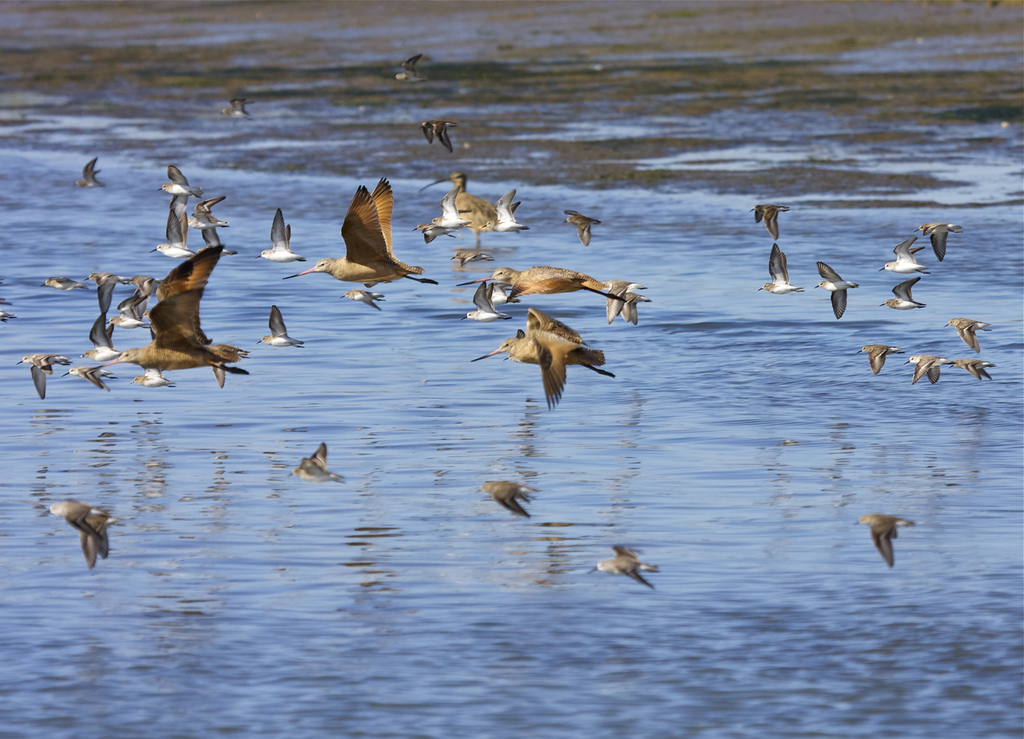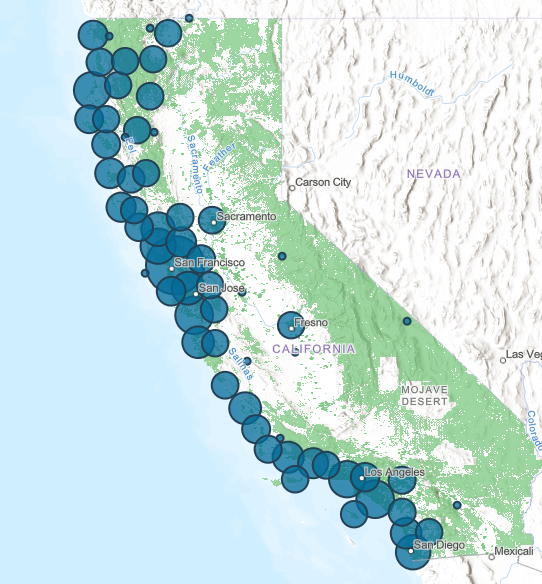News Release: Coastal Conservancy Awarded $2 Million for Wetland Restoration from U.S. Fish and Wildlife Service

Elkhorn Slough
Today, the California State Coastal Conservancy announced that it has received $2 million in grant funding for coastal wetland restoration from the U.S. Fish and Wildlife Service’s National Coastal Wetlands Conservation Grant Program.
The grant program annually provides grants of up to $1 million to coastal and Great Lakes states, as well as U.S. territories to protect, restore and enhance coastal wetland ecosystems and associated uplands. The grants are funded through the Sport Fish Restoration and Boating Trust Fund, which is supported by excise taxes on fishing equipment and motorboat fuel.
This year, $1 million each was awarded to the Big Canyon Wetlands Restoration Project in Newport Beach, and the Elkhorn Slough Tidal Marsh Restoration Phase 2 Project in Monterey County.
“National Coastal Wetlands Conservation funding only goes to projects of national importance.” said Sam Schuchat, Executive Officer of the California State Coastal Conservancy, “The two Conservancy projects funded this year will restore diverse and complex ecosystems that are part of the nation’s natural heritage.”
“Through the National Coastal Wetlands Conservation Grant Program, we are demonstrating our commitment to promoting coastal sustainability with healthy ecosystems, vibrant economies and resilient communities,” said U.S. Department of the Interior Secretary David Bernhardt.
Big Canyon Wetlands Restoration
The California State Coastal Conservancy will restore 9.6 acres of coastal wetlands and associated uplands draining to Upper Newport Bay in the 60-acre Big Canyon Nature Park in Newport Beach, California. The project goal is to restore a self-sustaining coastal wetlands complex across the tidal to freshwater to uplands continuum. Specifically, the project will restore and enhance 1,000 feet of channel and instream habitat, 5.8 acres of riparian scrub, 0.5 acres of alkali meadow and 3.3 acres of coastal sage scrub. Big Canyon Creek is in urgent need of habitat restoration and enhancement due to watershed impacts from channel incision, loss of floodplain, unstable banks, poor water quality and aggressive encroachment of invasive species. This project will benefit listed species including least Bell’s vireo, Belding’s savannah sparrow, coastal California gnatcatcher, light-footed Ridgway’s rail and California least tern.
Elkhorn Slough Tidal Marsh Restoration Phase 2
The California State Coastal Conservancy, in partnership with the Elkhorn Slough Foundation, California Department of Fish and Wildlife and the Elkhorn Slough National Estuarine Research Reserve, will restore approximately 30 acres of tidal wetlands in Elkhorn Slough and establish perennial grassland on five acres adjacent to the restored tidal wetlands. The project is Phase II of a larger plan to restore at least 100 acres of tidal marshes in Elkhorn Slough and the adjoining 35 acres of existing buffer areas to perennial grassland. The Elkhorn Slough estuary supports the largest tract of salt marsh on the west coast south of San Francisco Bay. Restoration of tidal marsh along the central coast of California carries particular significance because of the relative rarity of tidal marsh and the extent of its historic loss. Along the 300-mile stretch of coastline from Point Reyes to Point Conception, only 4,490 acres of tidal marsh exist, of which Elkhorn Slough accounts for 17 percent.
Notes to Editors:
The U.S. Fish and Wildlife Service’s National Coastal Wetlands Conservation Grant Program, funded in part through taxes paid on equipment and fuel purchases by recreational anglers and boaters, creates significant benefits for the American public. The billions of dollars generated through recreational angling, boating, waterfowl hunting and birdwatching benefit communities in the vicinity of wetlands restoration projects.
The Service awards grants of up to $1 million to states based on a national competition, which enables states to determine and address their highest conservation priorities in coastal areas. Since 1992, the Service has awarded more than $400 million in grants under the program.
More information can be found here: https://www.fws.gov/coastal/coastalgrants/
Latest News
- Press Release: Coastal Conservancy Awards over $40 million for coastal access, restoration, and climate resilienceOakland, CA (4/18/2024) – Today, the Board of the State Coastal Conservancy approved grants totaling over $40 million for coastal access, restoration, and climate resilience. Among the grants awarded today are: A grant of up to $6,000,000 to Humboldt County Resource Conservation District to undertake the North Coast Wildfire Resilience Planning and Implementation Grant Program, which […] (Read more on Press Release: Coastal...)
- Sea Otter Recovery Grants RFP Now Open!The California State Coastal Conservancy announces the availability of grants to public agencies, tribes and nonprofit organizations for projects that facilitate the recovery of the southern sea otter along California’s coasts. The California Sea Otter Fund is one of the state’s tax check-off funds that allows taxpayers to voluntarily contribute to the recovery of California’s […] (Read more on Sea Otter Recovery...)
- Coastal Conservancy Public Meeting in Oakland – April 18Meeting Notice Douglas Bosco (Public Member), Chair Marce Gutiérrez-Graudiņš (Public Member), Vice Chair Joy Sterling (Public Member) Jeremiah Hallisey (Public Member) Wade Crowfoot, Secretary for Natural Resources; Bryan Cash and Jenn Eckerle (Designated) Caryl Hart, Coastal Commission Chair; Madeline Cavalieri (Designated) Joe Stephenshaw, Director, Department of Finance; Michele Perrault (Designated) Senate Representatives Benjamin Allen (District […] (Read more on Coastal Conservancy Public...)

 Help Save Sea Otters at Tax Time
Help Save Sea Otters at Tax Time

